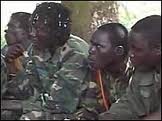Govt’s ‘military strategy against LRA will fail’
By John Stephen Katende
22nd Nov 2010
The network of European NGOs for advocacy on Central Africa [EurAc] has said the military strategy against the LRA will have no lasting impact without dialogue and negotiations.
In a statement issued in Brussels-Belgium on November 15th, EurAc said it had read with great interest the various reports and declarations by Human Rights Watch, Resolve, Enough, and the International Crisis Group on the problem of the Lord’s Resistance Army (LRA).
EurAc added that while it appreciates the attention that the different international bodies have given to this cause of instability and suffering in four countries, “…it is clear to EurAc and its members that none of the military operations have brought an end to the crimes committed by the LRA throughout this period”.
EurAc also said it believes that civil society organisations in the regions affected by the LRA have a crucial role to play in understanding the LRA phenomenon and in re-establishing dialogue.
EurAc affirms that a lasting solution to the LRA problem must be based on negotiation and dialogue. “…We share this vision with the religious leaders of the region. The military aspect is undoubtedly important but it cannot have a lasting impact if it is not part of a wider strategy”, the statement read in part.
In its statement, EurAc also made some recommendations to the European Union and its members states to among other things “…explore, protect, and enlarge the space for a non-violent approach and a negotiated settlement”.
For this to happen, the groups says, it is important to support the civil society actors, especially religious leaders, and the traditional authorities in their attempts to make contact with Joseph Kony to be certain that he is really willing to take part again in the Juba peace process.
EurAc also said it is important to mobilise every means to bring local LRA groups to attend and to remain within the process of demobilisation, disarmament and reintegration (DDR).
For the DDR policy to work, the group says, “…it is necessary to create on the ground a reception infrastructure”. Other than the infrastructure, EurAc also says affected communities need to be “trained” to receive LRA deserters rather than killing them.
In April 2008, LRA leader Joseph Kony failed to turn up in Garamba National Park in the Democratic Republic of Congo to sign the peace deal that had been negotiated in the Southern Sudanese city of Juba.
Thereafter, President Museveni, as Commander-in-Chief of the Uganda People’s Defence Forces [UPDF], ruled out ever engaging Kony in peace talks, preferring to deal with Kony’s group militarily.
The UPDF then launched “Operation Lighting Thunder” against the LRA which forced the rebel group to flee north towards Central African Republic. END. Please log into www.ugandacorrespondent.com every Monday to read our top stories and anytime mid-week for our news updates.
![]()


